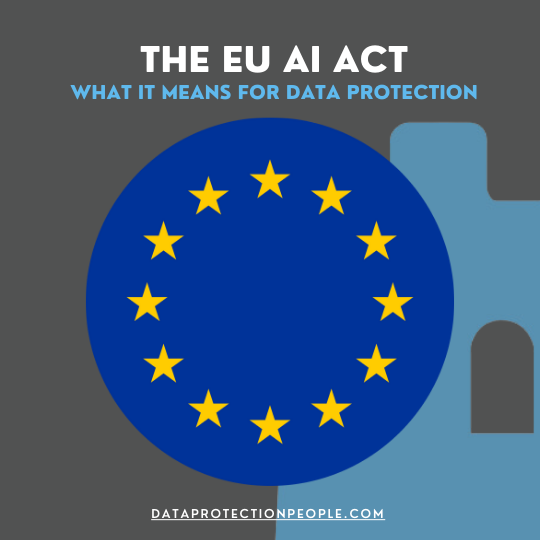The EU AI Act: What It Means for Data Protection
The rise of artificial intelligence (AI) has brought tremendous benefits to businesses and individuals alike, but it has also raised significant concerns about privacy, security, and accountability. In response, the European Union has introduced the EU AI Act, a landmark piece of legislation designed to regulate the development, deployment, and use of AI systems within the EU. The act aims to strike a balance between fostering innovation and ensuring the responsible and ethical use of AI.
In this article, we’ll dive into the key provisions of the EU AI Act, its implications for data protection, and how businesses can prepare for compliance. If you’re interested in learning more, we’ll be discussing the EU AI Act in depth during Episode 192 of the Data Protection Made Easy Podcast, taking place on 25th October. Click here to register and listen to our experts discuss this crucial legislation and its impact on data protection.
Understanding the EU AI Act
The EU AI Act is one of the first comprehensive efforts by a major regulatory body to govern the use of AI. Introduced in April 2021 by the European Commission, the act proposes a framework that classifies AI systems into four risk categories: Unacceptable Risk, High Risk, Limited Risk, and Minimal Risk. The act’s goal is to protect fundamental rights and promote trustworthy AI by ensuring that systems are transparent, secure, and accountable.
Key Provisions of the EU AI Act:
- Risk-Based Approach: The act takes a risk-based approach to regulation, meaning that AI systems that pose a higher risk to individuals’ rights will face stricter regulations. High-risk systems, such as those used in critical infrastructure, education, employment, and law enforcement, will be subject to rigorous oversight.
- Transparency and Documentation: AI providers will be required to maintain extensive documentation, including details on how the AI was developed, its intended purpose, and how it processes data. This ensures that AI systems are both transparent and accountable.
- Data Protection: The EU AI Act works in tandem with the GDPR to ensure that personal data used in AI systems is adequately protected. For example, AI systems that process personal data will need to comply with GDPR requirements around data minimisation, security, and user rights.
- AI Governance: The act introduces the creation of a European Artificial Intelligence Board, which will oversee the enforcement of the act, issue guidance, and ensure that AI systems within the EU are deployed ethically and responsibly.
Implications for Data Protection
For businesses using AI systems, the EU AI Act introduces several obligations that directly impact data protection practices. Companies will need to assess their AI systems for risk, ensure that they are designed with data protection principles in mind, and implement mechanisms for ongoing monitoring and compliance.
1. Compliance with GDPR:
AI systems that process personal data must comply with the General Data Protection Regulation (GDPR), particularly when it comes to consent, data minimisation, and user rights. Businesses will need to ensure that their AI systems are transparent about how personal data is used and that they have obtained explicit consent where necessary.
2. Risk Assessment and Mitigation:
High-risk AI systems, such as those used in healthcare, recruitment, or finance, will require rigorous risk assessments to identify potential impacts on individuals’ privacy and rights. These assessments must be carried out at the design phase and continuously monitored throughout the system’s lifecycle.
3. Human Oversight:
The act emphasises the need for human oversight in high-risk AI systems. This means that businesses will need to implement safeguards to ensure that AI systems do not make decisions autonomously without appropriate human intervention, especially in cases that could impact individuals’ rights.
How Businesses Can Prepare for the EU AI Act
Compliance with the EU AI Act will require businesses to take proactive steps to ensure their AI systems align with both the act’s requirements and broader data protection regulations. Here are some key steps businesses can take:
- Conduct a Risk Assessment: Start by identifying which of your AI systems may be classified as high-risk under the act. Assess their potential impact on individuals’ rights and take steps to mitigate any identified risks.
- Ensure GDPR Compliance: Review your AI systems to ensure they comply with the GDPR, particularly around data collection, consent, and user rights. If your systems process personal data, ensure that you have the necessary mechanisms in place to protect individuals’ privacy.
- Document AI Processes: Maintain detailed documentation of your AI systems, including how they were developed, their intended purpose, and how they handle data. This documentation will be critical in demonstrating compliance with the act’s transparency requirements.
- Establish Human Oversight Mechanisms: Implement safeguards to ensure that human oversight is in place for high-risk AI systems. Ensure that individuals can intervene if necessary and that the system’s decisions are explainable.
Conclusion: Why the EU AI Act Matters for Data Protection
As AI becomes more prevalent in businesses across all sectors, the EU AI Act represents a significant step towards ensuring that these systems are used responsibly. For organisations operating within the EU, or those that process the data of EU citizens, compliance with the act will be essential not only to avoid penalties but also to build trust with customers and demonstrate a commitment to ethical AI use.
To hear more about how the EU AI Act will impact businesses and the future of data protection, be sure to join us for Episode 192 of the Data Protection Made Easy Podcast on 25th October, where we will discuss this topic at length. Click here to register or listen on Spotify, Audible, or your preferred podcast platform.
For further insights, don’t miss our upcoming articles where we’ll explore other crucial aspects of AI and data protection, including the role of Microsoft Co-Pilot and Google Notebook in reshaping workplace productivity and the upcoming ISO/IEC 42001 standard on AI governance.

